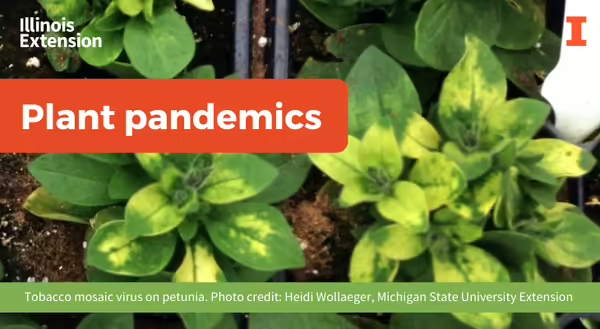
I bet you’re sick of reading about elections and politics. Fortunately, the Good Growing column is a welcome escape. Today I would like to dive into diseases. Oh, that’s right. We’re kind of in the middle of a global pandemic and I bet “disease” is not on the top of your list either.
Within our global pandemic of COVID-19, I hear scientists and doctors talk about recommendations for preventing the spread of disease. After listening to all the human health experts talk, one thing I realized, folks in the plant world have been dealing with “pandemic” type events for a long time.
Keep in mind, I am not a plant pathologist. Like a medical doctor, plant pathologists spend years learning about diseases. Learning how to identify signs of disease, eyes glued to microscopes, and playing with laboratory equipment. I am more comfortable with a shovel in my hand and dirt under my nails. Though as a person studies and works with plants, having to learn about plant disease is unavoidable.
Like humans, plants are beset by viruses, bacteria, fungi, and parasites. As our understanding of the microbiome grows, we’ve learned that also like humans most microorganisms don’t affect plants or could be considered beneficial. However, some plant diseases can be highly contagious.
One of the first widespread disease events I encountered was as a student at SIU Carbondale. The teaching greenhouses had been overrun with tobacco mosaic virus (TMV). The most common method of transmission for TMV is mechanical, meaning from workers' hands, tools, and even clothing. Greenhouse staff was able to track the introduction of the disease back to a student worker that smoked cigarettes. Cigarettes of course contain dried tobacco leaf, which this particular pack of smokes just so happened to also be carrying TMV.
If your cigarette was a carrier of TMV, and you smoke, your hands now have TMV on them. A smoker who opens the door to the greenhouse now leaves behind TMV on the door handle. Meaning anyone coming in or out of the greenhouse is a potential carrier. Are you starting to see how this disease can spread so fast? And perhaps some parallels to our current human pandemic?
TMV not only attacks tobacco plants but over 350 other species of plants. Notably plants within the nightshade (Solanaceae) family including edible and ornamental crops such as tomato and petunia.
When walking into commercial greenhouses where companies are producing thousands even millions of ornamental plants sold in nurseries around the country, often you will need to decontaminate your shoes or remove them. For highly sensitive production it is common to wear clean suits, hair/beard nets, and masks. And of course, mandatory handwashing.
If you work in the world of plants, you’ve been hardwired to spot disease vectors (how disease moves through a population) and eliminate possible transmission because your livelihood depends on selling healthy plants. A hose resting on the ground is unspeakable as fungal organisms can invade the nozzle and spread an infectious disease throughout an entire greenhouse in just one super-spreader watering event.
Understanding how a plant disease vectors through a crop is most of the battle. Taking steps to limit disease transmission reduces or avoids the expense of pesticides and other costly remediation. Determining disease vectors requires expertise and the time and money to do the research so growers can avoid catastrophic crop loss. Maybe one silver lining to a global pandemic is an emergence of interest in the field of pathology whether it be for humans or plants. Because let’s face it, the diseases aren’t going to stop, so we can’t either.
Good Growing Tip of the Week: Similar to humans, stress in plants makes them more susceptible to disease. Avoid stress by putting the right plant in the right place, planting correctly, and provide good care during weather extremes like drought.
Want to get notified when new Good Growing posts are available? SIGN UP HERE!